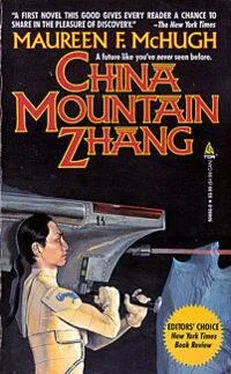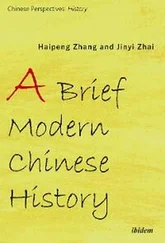"I'm sorry it's so corporate," Woo Eubong said before leaving the night before. "it's a bit impersonal, but you're only here for fifteen weeks. And it's better than the guesthouse."
I'm not sure I ever want to leave.
I go to work in the morning through the clean, twisting maze of the Wuxi complex, walking through passages with carved wooden handrails and climbing immaculate stone steps. People sympathize with me for having to spend so much time here. Woo Eubong tells me I have to come to her place for dinner some Saturday, just to get away from work. Hard to explain that I like it here just fine.
In the morning, from eight to noon, I do donkey work. I check figures, run things through the system, review jobs. Engineers hate that sort of paperwork. Mostly it's routine, although once in awhile there's something unusual, a novel solution to a problem. It's a good way to learn a lot about engineering. Building plans in front of me on flimsies, the system presents the entire building to me, supplements my own capacity and allows me to hold the entire building in my head and go over it. Although the work is routine, it takes me a morning to do five jobs, I have to call on the system to explain techniques to me. Woo Eubong tells me not to worry, in twelve weeks I'll find myself reviewing thirty or forty jobs in a morning, finish two or three complete buildings a day.
"It's the only way to really learn," she says. "You just have to get the experience of knowing so many jobs. Now you can run through the construction jobs as fast as anyone, it's the systems, the electrical, the utilities, the aesthetics that slow you down."
Particularly the systems and the aesthetics.
In the afternoon, I am Woo's student.
Woo is an organic engineer. That doesn't mean she works with growing things, it means that she plans work so that it makes organic sense. It seems to me that she doesn't plan at all. Daoist engineering. I refer to it that way once, and she says, "Right," without blinking. Irony doesn't translate.
Each daoist engineer learns from working one on one with a teacher, as I will learn from Woo Eubong. There are only a handful of daoist engineers in North America. It's not a specialty that is in much demand at home, mostly because we do not make the kinds of buildings that call for the subtlety of daoist engineering. They are very subtle buildings. Complex as bodies, with systems for nervous systems, and circulation and musculature. For homework she gives me the task of studying the Wuxi Engineering Technologies complex.
So at night I sit with flimsies in front of me, studying energy distribution and environmental monitoring. Normally because of airflow, room size, room adjacency, exposure and window size, different rooms have different temperatures. The system for Wuxi complex monitors temperature and humidity. But for an organic system, temperature is relative. My hands and feet are cooler than my head and chest. If I am sitting, I will find the room colder than if I am up and moving around. And different people respond to temperature in different ways, some are perpetually cold, some people aren't. We are sensitive to light, as well; a well lit place feels subjectively warmer than a dark place, and radiant heat from a window may heat one small area differently than another. Many buildings adjust room temperatures. The Wuxi Complex system also monitors the people jacked into it. People tell the system they are cold or warm and it adjusts. People, in fact, become nerve endings for the system. And the rooms are ingeniously structured so as to transfer heat from windows to darker areas, to increase the amount of outside light that comes in. It is part of the reason that the place is such a maze. Again and again I study a room and think, 'isn't that clever.'
The number of ingenious little details in this complex stagger the imagination. It is not only that the particular details are so good, but that they dovetail. The way a room is shaped to create heat transfer also allows for efficient use of space, creates offices that have some privacy without requiring that they be walled off, allows enough ambient noise for human comfort and privacy but not so much that noise becomes an irritant. I request the system alter a detail, see what would happen if a window were put in somewhere else, only to find that the result, while bringing in more light, reduces the effectiveness of energy absorption, or affects ventilation. It's as if this building were the result of biological evolution.
During the afternoon I draw paper houses. I sit, attuned, and imagine very simple buildings.
"Don't plan the building, let the system do that," Woo Eubong says. "You just let go, let your mind drift and do what it wants."
At first I don't even produce buildings, for two days I produce scribbles. Then one day I produce a very shaky looking pyramid sort of thing. I believe it is an accident, but Woo nods. "A pyramid is a very efficient shape, using the minimum number of surfaces. The only thing with fewer sides is a circle."
"Engineer Woo," I say, "I can detail a building a hundred times better than this."
"Certainly. But could you detail the complex?"
"I'm not an architectural and engineering team," I say.
"Wuxi Engineering Complex wasn't detailed by a team, it was detailed by one woman, using, of course, feedback from the departments that would be using the building."
I gape.
"Exactly," she says, smiling. "A team would not have constructed the building as a unit, but as a series of connected-but compromised and adjusted ideas."
"It can't be done. It had to have taken years."
"It did take over two years, but it can be done. I can't do it, there aren't many people who have the ability to do work on that grand a scale."
"But all those little details," I say.
She stops for a moment. As I said, she is a tall woman with a square face. She stands out among the company people, not for her height, but because she is different. Many of the engineers have this air about them. They are more casual-today she is in black coveralls-and they tend to work different hours. Sometimes they come in late, sometimes do a lot of work at home. When I came I thought there were two classes; cadres and workers. But the cadres sometime refer to organic engineers as talent.
"An example," she says. "Stand up."
I stand up, a little nervous.
"Walk to Hai-hong's desk."
I walk over to Hai-hong's desk, Hai-hong glances up at me expectantly, her look saying, 'what do you need?'
"Woo Eubong is making an example," I say.
Hai-hong nods and looks back down at her work. I walk back to Woo Eubong. "Yes?" I ask.
"When you passed your desk, you changed direction. How many degrees? How many steps did you take? How many meters to Hai-hong's desk?"
I shrug. "I don't know."
"You didn't calculate?" she asks. "You didn't analyze the situation and determine the best possible method to get to Hai-hong's desk?"
"No," I say, smiling a little, "I just walked over."
"But you had to figure the best way to walk. In fact, standing in front of me, your muscles are constantly adjusting to keep you upright, correct? Muscles in your legs and feet adjusting constantly to make sure you don't balance too far one way or another?"
"Well, yes," I say, "if you want to think of it that way."
"But you don't think to stand, or walk, or dance. Gymnasts don't calculate trajectories." She is smiling, too.
"I understand," I say.
"Good, I want you to make buildings the same way that you walk to Hai-hong's desk, thinking about the product, not the process."
"You are going to try to make me a mental gymnast," I say.
She shakes her head. "No, Li Jian-fen, who built this complex, she was a gymnast. You, I am teaching to walk."
Читать дальше












